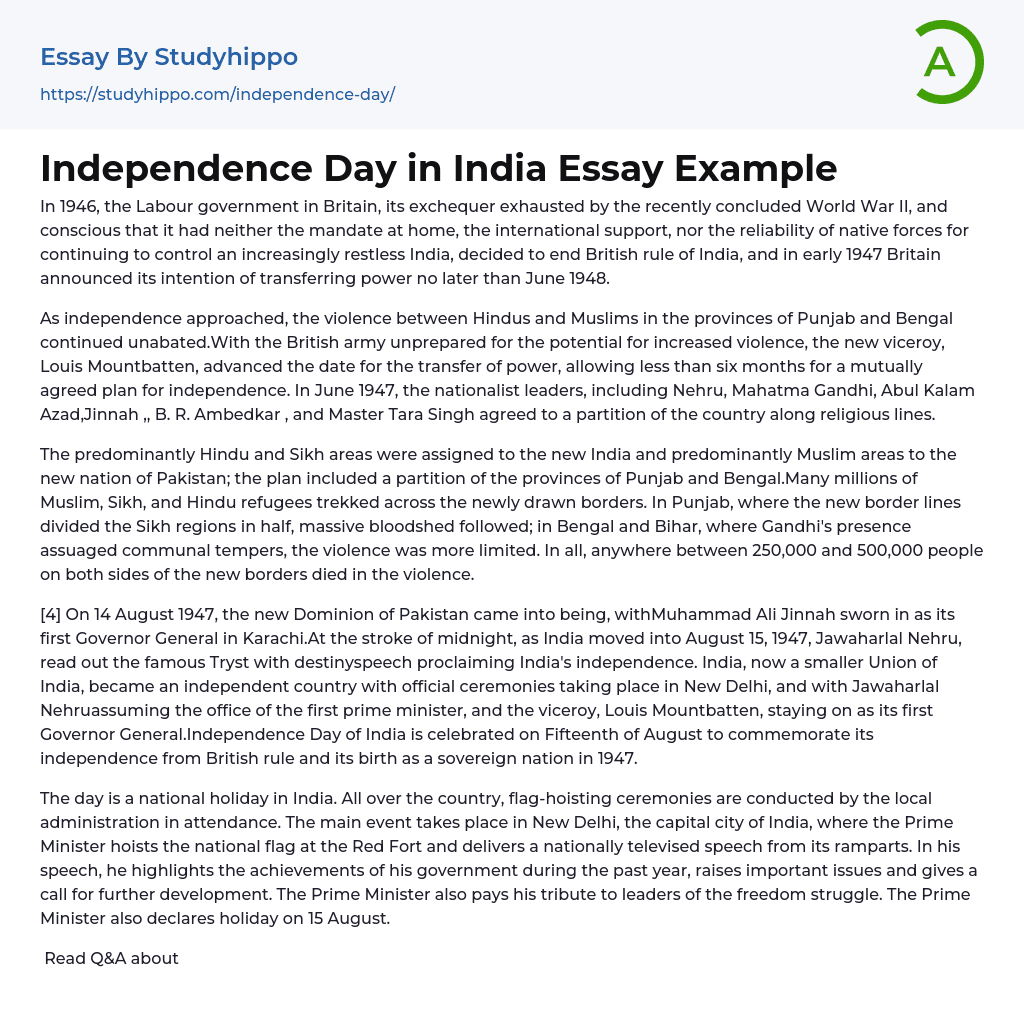Britain's Labour government, drained financially from World War II, recognized in 1946 that it lacked the necessary domestic mandate, global backing, and trustworthy indigenous forces to retain control over the unrestful India. Consequently, Britain set out to terminate its rule over India, publicly disclosing in early 1947 that power transfer would take place no later than June 1948.
As the time for independence drew near, the conflict between Hindus and Muslims in Punjab and Bengal persisted without respite. Due to the British army's unpreparedness for the potential escalation of violence, the incoming viceroy, Louis Mountbatten, moved up the transfer of power date, allowing less than six months to arrive at a consensus plan for independence. In June 1947, nationalist leaders such as Nehru, Mahatma Gandhi, Abul Kalam Azad, Jinnah, B. R. Ambedkar, and Master Tara Singh agreed to div
...ide the country along religious lines.
The concept of splitting Punjab and Bengal provinces involved allotting regions with a majority of Hindus and Sikhs to new India, while areas with mainly Muslims were assigned to the newly formed nation of Pakistan. This resulted in a significant number of refugees, including Muslims, Sikhs, and Hindus who had to traverse the recently created borders. The division also caused severe violence in Sikh regions of Punjab. In contrast, in Bengal and Bihar where Gandhi was present, communal tensions were eased resulting in less aggression. Unfortunately, during this tumultuous period between 250,000 and 500,000 people perished on both sides of the new borders.
[4] Muhammad Ali Jinnah was appointed the first Governor General of Pakistan in Karachi on August 14, 1947. Meanwhile, Jawaharlal Nehru delivered his renowned Tryst with Destiny speech proclaiming India'
independence. Official festivities took place in New Delhi to mark India's autonomy, with Nehru being named as the first prime minister and Louis Mountbatten continuing as Governor General. Presently, every August 15th, India observes its Independence Day honoring its emancipation from British rule and emergence as an independent nation in 1947.
Annually on 15 August, India observes a nationwide holiday marked by flag-raising ceremonies organized by local administrations across the country. The Prime Minister raises the national flag at Red Fort in New Delhi during the most significant event and delivers a nationally televised speech. In this discourse, he acknowledges his government's achievements and urges for further progress while also paying tribute to freedom fighters and proclaiming a 15 August holiday.
Get answers to your questions about satellite nations. On August 15, the Prime Minister of India raises the Indian flag at Red Fort in Delhi. This is broadcasted live on the National Channel Doordarshan and many other news channels throughout India. Flag-raising ceremonies and cultural events occur in all state capitals.
In cities across the country, politicians in their constituencies hoist the national flag, while senior officials in various private organizations carry out flag hoisting ceremonies. Citizens proudly display their patriotism by wearing flags distributed throughout the country. Schools and colleges organize flag hoisting ceremonies and cultural events, featuring younger children dressed as characters from the Independence era who participate in parades.
On Independence Day, Indians of all religions come together to celebrate as families, friends, and communities. Housing colonies, cultural centers, clubs, and societies organize entertainment and competitions with the theme of Independence Day. TV channels screen old and
new films with patriotic themes, and non-governmental organizations air patriotic programs. The importance of Independence Day to a nation's existence is invaluable.
On 15th August 1947, India achieved independence from the oppressive British colonialism which had controlled the entire government of the nation. This day is significant not just for its celebration of India's free statehood, but also for marking the victory of Indian patriotism. The British had initially come to India for business purposes and educated the Indians who later joined forces to fight for their freedom. This struggle was uncertain but brutal and resulted in India attaining a major part of the 562 territories spread throughout the Asian subcontinent that were owned by the British.
Although some individuals were acknowledged and others were disregarded, their ultimate objective was not to receive personal acclaim. Their altruistic efforts were fueled by the vision of a liberated and autonomous India. They did not wage war for their specific locality or community, but instead for the betterment of all citizens across India.
Amidst growing communal and caste conflicts, it is crucial to recall that the pioneers of autonomous India always imagined a unified country. Hence, it falls on us to uphold and preserve their aspirations, which is why we commemorate Independence Day in India. This day serves as an opportunity to respect and acknowledge those who bestowed upon us the precious present of liberty- a sigh of relief from subjugation and injustice.
- Bangladesh essays
- China essays
- Hong Kong essays
- India essays
- Japan essays
- Kuala Lumpur essays
- Malaysia essays
- Manila essays
- Pakistan essays
- Philippines essays
- Singapore essays
- Vietnam essays
- Vietnamese essays
- John Locke essays
- 9/11 essays
- A Good Teacher essays
- A Healthy Diet essays
- A Modest Proposal essays
- A&P essays
- Academic Achievement essays
- Achievement essays
- Achieving goals essays
- Admission essays
- Advantages And Disadvantages Of Internet essays
- Alcoholic drinks essays
- Ammonia essays
- Analytical essays
- Ancient Olympic Games essays
- APA essays
- Arabian Peninsula essays
- Argument essays
- Argumentative essays
- Art essays
- Atlantic Ocean essays
- Auto-ethnography essays
- Autobiography essays
- Ballad essays
- Batman essays
- Binge Eating essays
- Black Power Movement essays
- Blogger essays
- Body Mass Index essays
- Book I Want a Wife essays
- Boycott essays
- Breastfeeding essays
- Bulimia Nervosa essays
- Business essays
- Business Process essays
- Canterbury essays
- Carbonate essays




